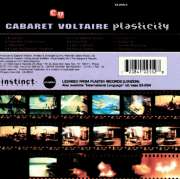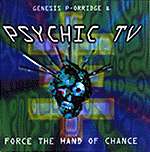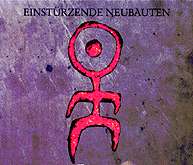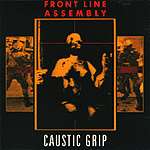Scraping The
Surface
of Industrial Music and
Culture
Deftly-D (a.k.a. David
Dodson) is a specialist in Industrial
Music. For five years, he has been spinning
radio shows dedicated to electronic/experimental music including Industrial,
Ambient, Experimental-Techno, Noise, Uncategorizable.
He runs the Electronic Experimental Industrial
DJ List, a big guide about Industrial
Music radio shows from around the world
(including electronic, experimental, ambient,
techno, performance art, goth, noise, &
anything remotely categorized as Industrial
Music)
Industrial
music is a complicated genre of music with a history
dating back at least to the 70's and a roots dating as far back
as the roots of electronic music itself. With the publicity that
has been given to artists such as Nine Inch Nails, Ministry,
KMFDM and Chem Lab as "industrial
artists" or "the industrial revolution" it is easy
to see industrial music as the latest trend of
music. Seemingly a simple fusion of speed metal and techno. This
view completely misses what industrial music is
about because it is based on the artists who seek publicity in
the mainstream of alternative rock music.
 Most will agree that
the origin of the term Industrial Music came in 1976
when Throbbing Gristle founded Industrial Records
as a distributor for deviant artists including themselves, Monte
Cazzazza, William S. Burroughs, ClockDVA, & Cabaret Voltaire. Monte
Cazzazza continued the idea with a slogan
"industrial music for industrial people." The idea of industrial
music was intended as a joke aimed at corporate rock, mass pressing
of music in factories, records being synonymous with files, etc.
The name industrial became a category for deviant musicians and artists associated and
influenced by the artists on Industrial Records.
Most will agree that
the origin of the term Industrial Music came in 1976
when Throbbing Gristle founded Industrial Records
as a distributor for deviant artists including themselves, Monte
Cazzazza, William S. Burroughs, ClockDVA, & Cabaret Voltaire. Monte
Cazzazza continued the idea with a slogan
"industrial music for industrial people." The idea of industrial
music was intended as a joke aimed at corporate rock, mass pressing
of music in factories, records being synonymous with files, etc.
The name industrial became a category for deviant musicians and artists associated and
influenced by the artists on Industrial Records.
The imagery that comes to mind from the
term industrial music influenced artists like Einstruzende
Neubauten, Test Dept, and SPK as well
as TG and ClockDVA to explore
factories and machines as musical instruments, atmospheres and performance
art. Although there are certainly predecessors at least as far
back as John Cage and musique concrete, Neubauten
could be said to have started one part of industrial music.
Including found sound, the use of junk, and particularly the use of
heavy machinery and scrap metal in performance and composition of music, Einstruzende
Neubauten have on occasion been called the "godfathers
of industrial music." TG
and Cabaret Voltaire among others have also explored William
S Burroughs' & Brian Gysan's cut up
theory as applied to sound. Due to these experiments they were inventing
their own samplers and keyboards in the 70's before digital
sampling became common in either synthesized pop music or in rap
music.
 TG
broke up into three very different projects that continued
exploring new forms of music. Psychic TV moved
from noise to dark soundscapes to cut up theory to psychedelic
rock to acid house to techno and made the Guinness Book of records for
putting out the most albums over a period of time. Genesis
P-Orrige, the TG member who formed Psychic
TV, also created (and destroyed) a cult called the Temple
Ov Psychic Youth. Before it's destruction TOPY
directly influenced the techno project The Psychic
Warriors Ov Gaia among many other experimental musical projects. Chris
+ Cosi, formed from Chris Carter and Cosi Fani-Tuti
of TG, explored exotic music and subliminal messages
among other paths. Peter "Sleazy"
Christopherson (who in the opinion of this writer
possesses artistic and technical genius on par with John
Cage, William Burroughs, Hank Shocklee
and Brian Eno) joined John Balance
in the formation of Coil, participated in Steven
Stapleton's experimental project Nurse With Wound
(the same could also be said here) and has directed videos (for Coil,
Nine Inch Nails, Ministry, Van Halen, Rage Against The Machine, and Front
242 among others) and short films. Both Coil
and Nurse With Wound are very twisted and
technically innovative projects that sounds like no other band out
there and change the way they create music constantly. Although
the work was not used for the film, Clive Barker originally
requested Coil do the score for Hellraiser,
but the producers rejected Coil due to Mr.
Barker describing them as "the band whose records I
have to take off because they make my bowels churn." The scores
have since received better reviews than the film they were intended
for.
TG
broke up into three very different projects that continued
exploring new forms of music. Psychic TV moved
from noise to dark soundscapes to cut up theory to psychedelic
rock to acid house to techno and made the Guinness Book of records for
putting out the most albums over a period of time. Genesis
P-Orrige, the TG member who formed Psychic
TV, also created (and destroyed) a cult called the Temple
Ov Psychic Youth. Before it's destruction TOPY
directly influenced the techno project The Psychic
Warriors Ov Gaia among many other experimental musical projects. Chris
+ Cosi, formed from Chris Carter and Cosi Fani-Tuti
of TG, explored exotic music and subliminal messages
among other paths. Peter "Sleazy"
Christopherson (who in the opinion of this writer
possesses artistic and technical genius on par with John
Cage, William Burroughs, Hank Shocklee
and Brian Eno) joined John Balance
in the formation of Coil, participated in Steven
Stapleton's experimental project Nurse With Wound
(the same could also be said here) and has directed videos (for Coil,
Nine Inch Nails, Ministry, Van Halen, Rage Against The Machine, and Front
242 among others) and short films. Both Coil
and Nurse With Wound are very twisted and
technically innovative projects that sounds like no other band out
there and change the way they create music constantly. Although
the work was not used for the film, Clive Barker originally
requested Coil do the score for Hellraiser,
but the producers rejected Coil due to Mr.
Barker describing them as "the band whose records I
have to take off because they make my bowels churn." The scores
have since received better reviews than the film they were intended
for.
 With the onset of
digital sampling and sequencing industrial music joined
at the roots of house music in Chicago. Artists like Front
242, Meat Beat Manifesto, BiGod 20, Cabaret Voltaire, Kraftwerk
and ClockDVA are just some of the pioneers and innovators
who have permanently altered the path of techno's development. Chicago's Wax
Trax Records during the 80's held releases by almost all
of the great industrial artists of it's time including releases
by pioneers and early industrialists Coil, Psychic TV, Chris
& Cosi, Test Dept, Laibach, Controlled Bleeding, ClockDVA
to the newer prolific artists including Frontline
Assembly, My Life With The Thrill Kill Kult, Greater Than One, KMFDM,
Meat Beat Manifesto, Ministry/Revolting Cocks and the
multitude of side projects. Around the same time Skinny
Puppy originated a branch of industrial music that has
continued expanding and influencing modern industrial artists
including Haujobb, Project Pitchfork, Mentallo & The Fixer,
Oneiroid Psychosis, and Alien Faktor. Skinny
Puppy also in loosing one of it's members early on
allowed the formation of another highly influential industrial project, Frontline
Assembly. Both of these projects have had multiple side
projects with separate identities.
With the onset of
digital sampling and sequencing industrial music joined
at the roots of house music in Chicago. Artists like Front
242, Meat Beat Manifesto, BiGod 20, Cabaret Voltaire, Kraftwerk
and ClockDVA are just some of the pioneers and innovators
who have permanently altered the path of techno's development. Chicago's Wax
Trax Records during the 80's held releases by almost all
of the great industrial artists of it's time including releases
by pioneers and early industrialists Coil, Psychic TV, Chris
& Cosi, Test Dept, Laibach, Controlled Bleeding, ClockDVA
to the newer prolific artists including Frontline
Assembly, My Life With The Thrill Kill Kult, Greater Than One, KMFDM,
Meat Beat Manifesto, Ministry/Revolting Cocks and the
multitude of side projects. Around the same time Skinny
Puppy originated a branch of industrial music that has
continued expanding and influencing modern industrial artists
including Haujobb, Project Pitchfork, Mentallo & The Fixer,
Oneiroid Psychosis, and Alien Faktor. Skinny
Puppy also in loosing one of it's members early on
allowed the formation of another highly influential industrial project, Frontline
Assembly. Both of these projects have had multiple side
projects with separate identities.
In the late 80's Ministry
became the first "industrial group" to become highly
exposed. With many being introduced to Ministry
(who had just changed from the synth industrial dance music of Twitch
to the programmed Speedmetal of Land of Rape & Honey)
as their only industrial influence, a host of rock artists began
forming similar bands that they called industrial without knowing
about the roots, while ironically Al Jourgensen
of Ministry was proclaiming they were not industrial
artists at all and was recommending Neubauten
and Test Dept in countless interviews.
 Since Ministry
has attained the spotlight there have been a small handful of
other artists who have moved into the mainstream including Front
242, Frontline Assembly, Nine Inch Nails, Skinny Puppy,
and KMFDM. Since it's origin industrial artists
have touched nearly every form of music from symphony orchestra
& world music (Test Dept, Coil, Foetus Inc.),
to disco (My Life With The Thrill Kill Kult, Electric
Hellfire Club, Coil), to speed metal (Foetus
Inc., Controlled Bleeding, KMFDM, Ministry) to rap music
(Meat Beat Manifesto, Consolidated, Disposable Heroes of
HipHoprisy), techno (Meat Beat Manifesto,
Lassigue Bendthaus, Frontline Assembly, Coil), and
musical forms that have uniquely evolved from industrial music (Skinny
Puppy, Einstruzende Neubauten, Haujobb, Abstinence, Negativeland,
Laibach, Evilution Control Committee, 31337, Nurse With Wound,
Severed Heads, Chem Lab, Emergency Broadcast Network, Laibach).
Since Ministry
has attained the spotlight there have been a small handful of
other artists who have moved into the mainstream including Front
242, Frontline Assembly, Nine Inch Nails, Skinny Puppy,
and KMFDM. Since it's origin industrial artists
have touched nearly every form of music from symphony orchestra
& world music (Test Dept, Coil, Foetus Inc.),
to disco (My Life With The Thrill Kill Kult, Electric
Hellfire Club, Coil), to speed metal (Foetus
Inc., Controlled Bleeding, KMFDM, Ministry) to rap music
(Meat Beat Manifesto, Consolidated, Disposable Heroes of
HipHoprisy), techno (Meat Beat Manifesto,
Lassigue Bendthaus, Frontline Assembly, Coil), and
musical forms that have uniquely evolved from industrial music (Skinny
Puppy, Einstruzende Neubauten, Haujobb, Abstinence, Negativeland,
Laibach, Evilution Control Committee, 31337, Nurse With Wound,
Severed Heads, Chem Lab, Emergency Broadcast Network, Laibach).
Unlike most musical categories Industrial
music is not defined by musical similarity but rather
philosophy. The industrial musicians who follow the spirit of the
artists on Industrial Records are not focused on
sounding like them but rather trying to do something completely different
derived from their own experiences. Because of this there are vast
disagreements as to what Industrial Music is.
There is however little doubt that industrial music
has played a strong part in the growth and influence of most
modern forms of electronic music from the synth pop of the 80's
to rave, and alternative rock.
Some good resources to learn more about
this music include RE-Search's Industrial Culture Handbook
which covers many of the originators of industrial music
and performance art, The FAQ for
Rec.Music.Industrial, The Industrial Page, and
although it is now out of date and has many flaws Dave
Thomas' book Industrial Revolution gives information
and history behind many of the important artists in the industrial
music scene. I have many direct contacts with artists, labels,
dj's and publications in the industrial music
scene and also associated with other genre's of the electronic
experimental underground listed at Zero
Times Infinity.
 Previous Page (Articles/News)
Previous Page (Articles/News)
 Most will agree that
the origin of the term Industrial Music came in 1976
when Throbbing Gristle founded Industrial Records
as a distributor for deviant artists including themselves, Monte
Cazzazza, William S. Burroughs, ClockDVA, & Cabaret Voltaire. Monte
Cazzazza continued the idea with a slogan
"industrial music for industrial people." The idea of industrial
music was intended as a joke aimed at corporate rock, mass pressing
of music in factories, records being synonymous with files, etc.
The name industrial became a category for deviant musicians and artists associated and
influenced by the artists on Industrial Records.
Most will agree that
the origin of the term Industrial Music came in 1976
when Throbbing Gristle founded Industrial Records
as a distributor for deviant artists including themselves, Monte
Cazzazza, William S. Burroughs, ClockDVA, & Cabaret Voltaire. Monte
Cazzazza continued the idea with a slogan
"industrial music for industrial people." The idea of industrial
music was intended as a joke aimed at corporate rock, mass pressing
of music in factories, records being synonymous with files, etc.
The name industrial became a category for deviant musicians and artists associated and
influenced by the artists on Industrial Records. TG
broke up into three very different projects that continued
exploring new forms of music. Psychic TV moved
from noise to dark soundscapes to cut up theory to psychedelic
rock to acid house to techno and made the Guinness Book of records for
putting out the most albums over a period of time. Genesis
P-Orrige, the TG member who formed Psychic
TV, also created (and destroyed) a cult called the Temple
Ov Psychic Youth. Before it's destruction TOPY
directly influenced the techno project The Psychic
Warriors Ov Gaia among many other experimental musical projects. Chris
+ Cosi, formed from Chris Carter and Cosi Fani-Tuti
of TG, explored exotic music and subliminal messages
among other paths. Peter "Sleazy"
Christopherson (who in the opinion of this writer
possesses artistic and technical genius on par with John
Cage, William Burroughs, Hank Shocklee
and Brian Eno) joined John Balance
in the formation of Coil, participated in Steven
Stapleton's experimental project Nurse With Wound
(the same could also be said here) and has directed videos (for Coil,
Nine Inch Nails, Ministry, Van Halen, Rage Against The Machine, and Front
242 among others) and short films. Both Coil
and Nurse With Wound are very twisted and
technically innovative projects that sounds like no other band out
there and change the way they create music constantly. Although
the work was not used for the film, Clive Barker originally
requested Coil do the score for Hellraiser,
but the producers rejected Coil due to Mr.
Barker describing them as "the band whose records I
have to take off because they make my bowels churn." The scores
have since received better reviews than the film they were intended
for.
TG
broke up into three very different projects that continued
exploring new forms of music. Psychic TV moved
from noise to dark soundscapes to cut up theory to psychedelic
rock to acid house to techno and made the Guinness Book of records for
putting out the most albums over a period of time. Genesis
P-Orrige, the TG member who formed Psychic
TV, also created (and destroyed) a cult called the Temple
Ov Psychic Youth. Before it's destruction TOPY
directly influenced the techno project The Psychic
Warriors Ov Gaia among many other experimental musical projects. Chris
+ Cosi, formed from Chris Carter and Cosi Fani-Tuti
of TG, explored exotic music and subliminal messages
among other paths. Peter "Sleazy"
Christopherson (who in the opinion of this writer
possesses artistic and technical genius on par with John
Cage, William Burroughs, Hank Shocklee
and Brian Eno) joined John Balance
in the formation of Coil, participated in Steven
Stapleton's experimental project Nurse With Wound
(the same could also be said here) and has directed videos (for Coil,
Nine Inch Nails, Ministry, Van Halen, Rage Against The Machine, and Front
242 among others) and short films. Both Coil
and Nurse With Wound are very twisted and
technically innovative projects that sounds like no other band out
there and change the way they create music constantly. Although
the work was not used for the film, Clive Barker originally
requested Coil do the score for Hellraiser,
but the producers rejected Coil due to Mr.
Barker describing them as "the band whose records I
have to take off because they make my bowels churn." The scores
have since received better reviews than the film they were intended
for. With the onset of
digital sampling and sequencing industrial music joined
at the roots of house music in Chicago. Artists like Front
242, Meat Beat Manifesto, BiGod 20, Cabaret Voltaire, Kraftwerk
and ClockDVA are just some of the pioneers and innovators
who have permanently altered the path of techno's development. Chicago's Wax
Trax Records during the 80's held releases by almost all
of the great industrial artists of it's time including releases
by pioneers and early industrialists Coil, Psychic TV, Chris
& Cosi, Test Dept, Laibach, Controlled Bleeding, ClockDVA
to the newer prolific artists including Frontline
Assembly, My Life With The Thrill Kill Kult, Greater Than One, KMFDM,
Meat Beat Manifesto, Ministry/Revolting Cocks and the
multitude of side projects. Around the same time Skinny
Puppy originated a branch of industrial music that has
continued expanding and influencing modern industrial artists
including Haujobb, Project Pitchfork, Mentallo & The Fixer,
Oneiroid Psychosis, and Alien Faktor. Skinny
Puppy also in loosing one of it's members early on
allowed the formation of another highly influential industrial project, Frontline
Assembly. Both of these projects have had multiple side
projects with separate identities.
With the onset of
digital sampling and sequencing industrial music joined
at the roots of house music in Chicago. Artists like Front
242, Meat Beat Manifesto, BiGod 20, Cabaret Voltaire, Kraftwerk
and ClockDVA are just some of the pioneers and innovators
who have permanently altered the path of techno's development. Chicago's Wax
Trax Records during the 80's held releases by almost all
of the great industrial artists of it's time including releases
by pioneers and early industrialists Coil, Psychic TV, Chris
& Cosi, Test Dept, Laibach, Controlled Bleeding, ClockDVA
to the newer prolific artists including Frontline
Assembly, My Life With The Thrill Kill Kult, Greater Than One, KMFDM,
Meat Beat Manifesto, Ministry/Revolting Cocks and the
multitude of side projects. Around the same time Skinny
Puppy originated a branch of industrial music that has
continued expanding and influencing modern industrial artists
including Haujobb, Project Pitchfork, Mentallo & The Fixer,
Oneiroid Psychosis, and Alien Faktor. Skinny
Puppy also in loosing one of it's members early on
allowed the formation of another highly influential industrial project, Frontline
Assembly. Both of these projects have had multiple side
projects with separate identities. Since Ministry
has attained the spotlight there have been a small handful of
other artists who have moved into the mainstream including Front
242, Frontline Assembly, Nine Inch Nails, Skinny Puppy,
and KMFDM. Since it's origin industrial artists
have touched nearly every form of music from symphony orchestra
& world music (Test Dept, Coil, Foetus Inc.),
to disco (My Life With The Thrill Kill Kult, Electric
Hellfire Club, Coil), to speed metal (Foetus
Inc., Controlled Bleeding, KMFDM, Ministry) to rap music
(Meat Beat Manifesto, Consolidated, Disposable Heroes of
HipHoprisy), techno (Meat Beat Manifesto,
Lassigue Bendthaus, Frontline Assembly, Coil), and
musical forms that have uniquely evolved from industrial music (Skinny
Puppy, Einstruzende Neubauten, Haujobb, Abstinence, Negativeland,
Laibach, Evilution Control Committee, 31337, Nurse With Wound,
Severed Heads, Chem Lab, Emergency Broadcast Network, Laibach).
Since Ministry
has attained the spotlight there have been a small handful of
other artists who have moved into the mainstream including Front
242, Frontline Assembly, Nine Inch Nails, Skinny Puppy,
and KMFDM. Since it's origin industrial artists
have touched nearly every form of music from symphony orchestra
& world music (Test Dept, Coil, Foetus Inc.),
to disco (My Life With The Thrill Kill Kult, Electric
Hellfire Club, Coil), to speed metal (Foetus
Inc., Controlled Bleeding, KMFDM, Ministry) to rap music
(Meat Beat Manifesto, Consolidated, Disposable Heroes of
HipHoprisy), techno (Meat Beat Manifesto,
Lassigue Bendthaus, Frontline Assembly, Coil), and
musical forms that have uniquely evolved from industrial music (Skinny
Puppy, Einstruzende Neubauten, Haujobb, Abstinence, Negativeland,
Laibach, Evilution Control Committee, 31337, Nurse With Wound,
Severed Heads, Chem Lab, Emergency Broadcast Network, Laibach).